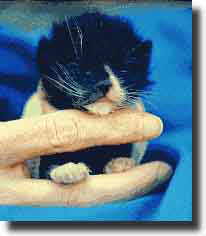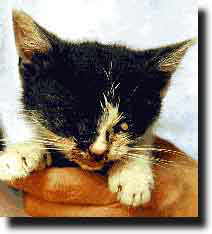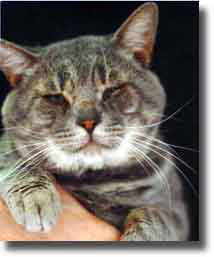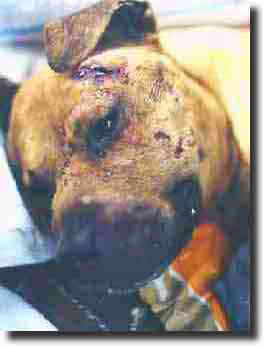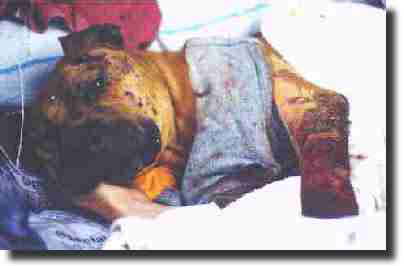This page is dedicated to the little troopers we could
not save.
We share their stories with you so their lives will
not have gone unnoticed.

Expressway to Heaven
by Alice Arnold with Lillian G. Leslie
Besides worrying about animals in the alleys, Iíve started worrying about animals Iíll see on the way there. We use the Expressway into the city most of the time, and Iíve learned I must be watchful for animals on and around the roadway. Not long ago I stopped to take a closer look at a deer who had been hit by a car and was lying in the road; I wanted to find out if she was still alive -- she wasnít. Keeping vigil nearby was a second doe, just standing there looking at her companion dead in the road. Traffic subsided so I walked slowly toward her. I told her she shouldnít stay here, that her friend had been killed and she would be too if she didnít leave. She looked at me and for a moment we both felt the pain of her loss. In her eyes I saw the hurt and fear. In a flash she jumped the guard rail and fled into the brush. I moved the dead deer to the side of the road, and as I got back in the car I thought to myself, I hope I donít find her friend next.
Later that week I was in the expresswayís middle lane on my way to the alleys when something caught my eye. At first I thought it was probably a piece of trash but I decided to be sure. This wouldnít be easy because the object was leaning against the wall separating the north and southbound lanes. I pulled over and waited for a break in the traffic then I ran across the Expressway to the wall. When I approached I couldnít see very well -- it was after midnight in a dark stretch of the road and the object was in the shadows. I kept walking in the shoulder of the fast lane until I got to the thing I thought might have been trash. A calico kitten, maybe 8 weeks old.
I made a small sound and she looked up; I couldnít believe she was alive. She cried to me and I quickly picked her up and hurried back to the car. The kitten was shaking and cold so I put her under my coat where she buried herself to get warm. It was as if she couldnít get close enough to me. I kept wondering how on earth did she cross four lanes of traffic without getting hit? Or, did someone put her out of the car and just leave her there by the wall?
Our friend Jeanie Willis kept the little one in foster care until the right family came along to adopt her. Now she lives in a wonderful home with people who will be sure that she never again knows the feel of cold highway cement beneath her feet or the sound of thundering traffic overhead with nowhere to go and no one to help.
On the way to and from the alleys I look from side to side, hoping I donít miss any other small creature needing help by the road. I know they are there, I just have to stay alert enough to see them. And sure enough, one night on the way back from the alleys a black lump lying again, near the dividing center wall three lanes over, caught my attention. ďCould be a paper bag,Ē I thought, but I had to find out.
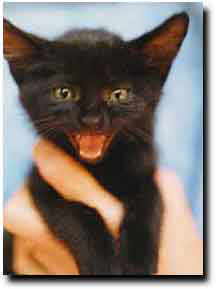
|
Again the object was in the shadows of a dark section of the expressway where I pulled over, waiting for traffic to pass, and ran across the highway. This time the lump huddled by the wall, frozen in fear was a tiny black kitten. I made a cat sound and she looked up at me; she cried the loudest cry I think Iíve ever heard. I waited for more cars to pass before attempting to pick her up, just in case she tried to dash away. As soon as the traffic cleared I grabbed her and ran back across the lanes of the expressway to my car.
Once inside I looked her over to see if she was hurt but miraculously she was not, although she was skin-and-bones and possibly 5 weeks old (her eyes were still blue). I opened a can of food and before I could give it to her she was screaming for it. As I watched her gobble down the food I wondered how a tiny kitten winds up in the shoulder of the fast lane on a busy highway. I wondered how long she had been there and how many people passed her by.
The doctor said she escaped the ordeal with no broken bones or other observable trauma, just scrapes and bruises. And, she was malnourished -- even I could see that she was way too thin for a kitten who should be well-fed and plump.
For three weeks she ate as much as she wanted and played with other kittens; she slept in a pillowy bed and welcomed all the extra kisses I gave her. But she didnít grow. One day she stopped eating and the next morning I found her body lying in the bed she loved so much. I knew her special little soul was in a far better place now, but the sadness of losing her stayed with me. In her short time on this earth she knew more fear than most of us will ever know. Itís like that for too many little ones out there, they live and die in fear. But for Express (thatís what I called her), life granted three weeks of safety, love, and the freedom to be a kitten before she left me.

|
Miracle
by Annie
My name is Annie and I love animals. My love for animals goes way back to when I was a child and I would try to help the ones people dumped in the Park. But I'd never seen anything like this.
Alice called to ask if I would help a cat stuck in a fence near my neighborhood. I did not think it would be that bad, so I sent my niece to get the cat off the fence. She came back saying no one could get the cat off the fence because the wire was through the back of his neck and he was just hanging there.
When I told my niece I would go and see for myself, she suggested I take bolt cutters with me. I thought it really couldn't be that bad, but when I got there I was sick to my stomach. I had never used bolt cutters before and it was hard for me, but I had to cut the fence more than three times in order to get the kitten out.
He looked half dead. I was cutting a part of the fence away so I could get to him and he started to cry; it hurts just to think of it, but God gave me the strength and I took him down from where he had been hanging.
I put him in a small carrier and took him home with me; I was sure he would die on the ride back, but an hour later he was still moving around in the carrier. I went out for some mother's milk replacer and first aid supplies so that I could take care of him until we could get him to the vet. That was yesterday evening.
Today is Sunday and I'm getting ready to feed him an afternoon bottle. He is about three weeks old and cute as a button - I named him Miracle.
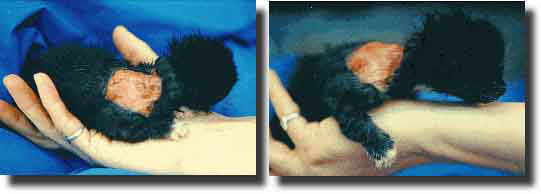
Update:
The infant Annie rescued from the fence suffered hideous cruelty. At two or three weeks old, he was still too young to walk - he did not hang himself on the fence.
How is it that the human heart, capable of great compassion, can also be capable of wickedness so repugnant as to torture an infant? A few hours after Annie wrote this story, Miracle died. ††† --ed.

|
Some Other Land
by Lillian G. Leslie
Daybreak was on us in the alleys. I braced myself for the bumps and swings as we rounded a corner and Dee said, "This is a new stretch -- nursing mothers and kittens through here." As usual I scanned the alley for people; we do our best to avoid giving away homeless animals' locations because the possibility lurks in every alley that some nasty person will commit acts of cruelty. So part of my job is to alert Dee to potential onlookers; she then judges whether or not we can safely call the animals out from hiding to eat the food we leave for them.
We were only a few yards into the alley when Dee braked, hard. I took my eyes off our surroundings to see what so abruptly captured her attention. Smack in the middle of the alley sat a tiny kitten; our vehicle's roar didn't startle her away, she just sat there as if openly presenting herself to fate. Clearly she was in advancing stages of illness -- her eyes were pasted shut and her nostrils were thickly encrusted.
"Throw bits of tuna in her direciton, but go up from behind," Dee told me. She was putting me in charge of getting out to secure the vulnerable creature. Even in the case of a healthy, relatively friendly kitten, this instruction would carry the weight of responsibility; in a second anything can go wrong. A siren might scare the little one into hiding or a person could come along interrupting the procedure. The result: an animal so close to being taken away from a life of misery on the streets must stay. In attempting to secure a sick or injured animal the stakes are far higher, owing to the immediacy and severity of his or her suffering. These thoughts wound themselves around my brain as I took the open can of tuna and a large towel, and quietly got out of the car.
In my experience, although a kitten may be sick he may fiercely resist capture (even by a well-meaing person). A casual attitude invites disaster. I was prepared for failure yet determined to succeed in my efforts on behalf of the baby sitting on the cement in front of me.
She could neither see me nor smell the bits of food I tossed, but she could hear. Her little head turned toward the soft thud of the tuna as it hit the ground; I was hoping to distract her attention away from me as I moved up close behind her. The time was right. My arm shot out, my fingers grabbed her scuff and, in one swift movement, I wrapped the towel around her body. In less than three seconds she was mine. As I stood up I realized she wasn't fighting, she wasn't showing the least resistance. I loosened my grip on her neck but I did not let go -- couldn't risk loosing her, not now. Dee had the carrier door open when I returned to the car. The kitten rested through the remainder of the alley route, stirring only occasionally to issue a faint mew in response to the car's jostling over rough alley terrain.
When our work was finished we gave the kitten a place to continue her rest. We cleaned her eyes and nostrills -- I wondered how long she'd gone without opening her eyes or breathing through her nose. She took down quite a volume of mother's milk replacer before curling up to sleep.
An hour or so later I checked in on the baby. I knew a trip to the vet was in order and that she'd no doubt need to be hospitalized. For the moment I hoped only to find her comfortable; I stroked her head and listened for the glimmer of a purr but her weary body wasn't ready to release sounds of contentment.
I watched her as she lay there and pondered the sad fact that one so young knew life as the bringer of hardship and pain. Had she ever been well enough to play? I imagined her batting a leaf and tumbling gleefully as she chased her own tail in some far off, carefree moment of kittenhood. My wishful thinking was cut short when the little one tried to stand up. I could see her distress.
She was making a sound similar to a high-pitched growl; it was a guttural sound, out-of-place coming from a kitten and I sensed (with great reluctance) the end was near. I cupped her face in my palms and stroked her forehead with my thumb. I wanted to remind her of a time when her mother comforted and cared for her, a time when her mother was always nearby.
But now death was the one close by and coming to bring the only relief possible to this tormented young soul. Her agitation ended a few short minutes after it began and, as I laid her head on the towel, I imagined her spirit romping freely in some other land, a land far better than the one she'd left.

Dover
Left behind, Dover couldnít find food because he didnít know how. His eyes were caked and encrusted with a festering eye infection so that he could barely open them. One morning he heard our familiar call and blindly made his way, feeling every inch before taking a step. Even though he couldnít see, somehow he managed to stay out of harmís way long enough for us to find him - he couldnít have survived many more days on the streets.
Note: Dover is in a better place now. No longer will he feel the pain of life on the streets nor the fear of being left to survive on his own. Dover was diagnosed with Feline Leukemia.

The Superiority of Man
Dee and her partner had finished the east side's alleys and were heading home when they saw a police car blocking the right hand lane of the road ahead. As they drove past they saw a dog lying in front of the police car. Dee pulled over. Her first thought was that the police had shot the dog,but one of the officers explained they found him lying in the road and were trying to contact someone from Animal Control.
Dee looked at the dog, a large Pitbull with multiple and severe puncture wounds all over his bloodied body; he was alive and fully conscious - the fear in his expression unmistakable - but he was dying, the loser in a fight to the death one way or another.
After identifying herself as a humane worker with an animal organization, Dee asked whether the officers minded if she took the dog; the male officer assisted in putting him in the back of the alley car.
He was useless now to those who forced him to become what he was just a few short hours before; a vicious killer, eager to fight. He was a product, with no life of his own, to those who had used him. Non-human life is cheap - even meaningless - to the people who fight dogs; how many smaller animals had this dog brutally killed during his "training"? They took the dying Pitbull to the veterinarian where his days of pain and suffering were quietly, respectfully put to an end.
Widespread dog fighting and baiting of smaller animals tells a sorry tale of human nature. The sight of this dying dog and the circumstances behind it can but call into question any notion of automatic superiority some people attach to human beings over the "lower" species.
"The greatness of a nation and its moral progress
can be judged by the way its animals are treated."
--Gandhi
|














